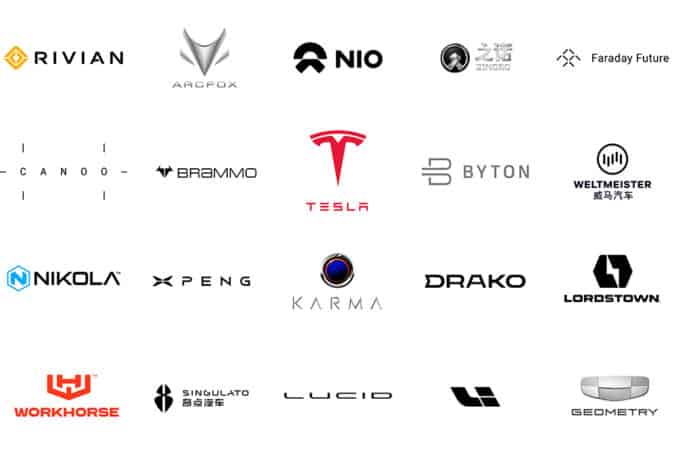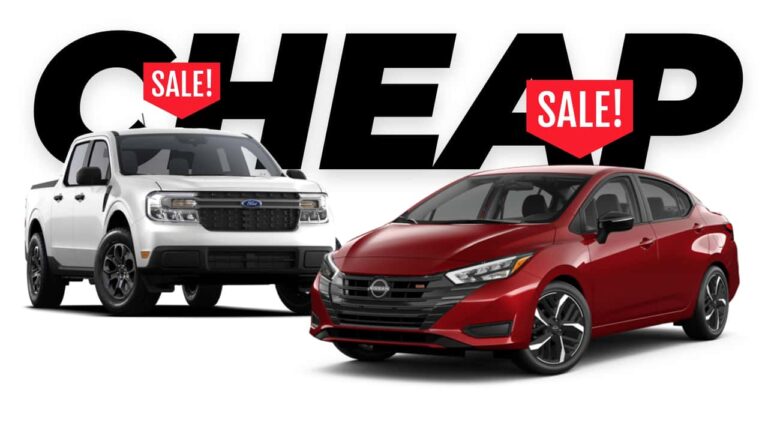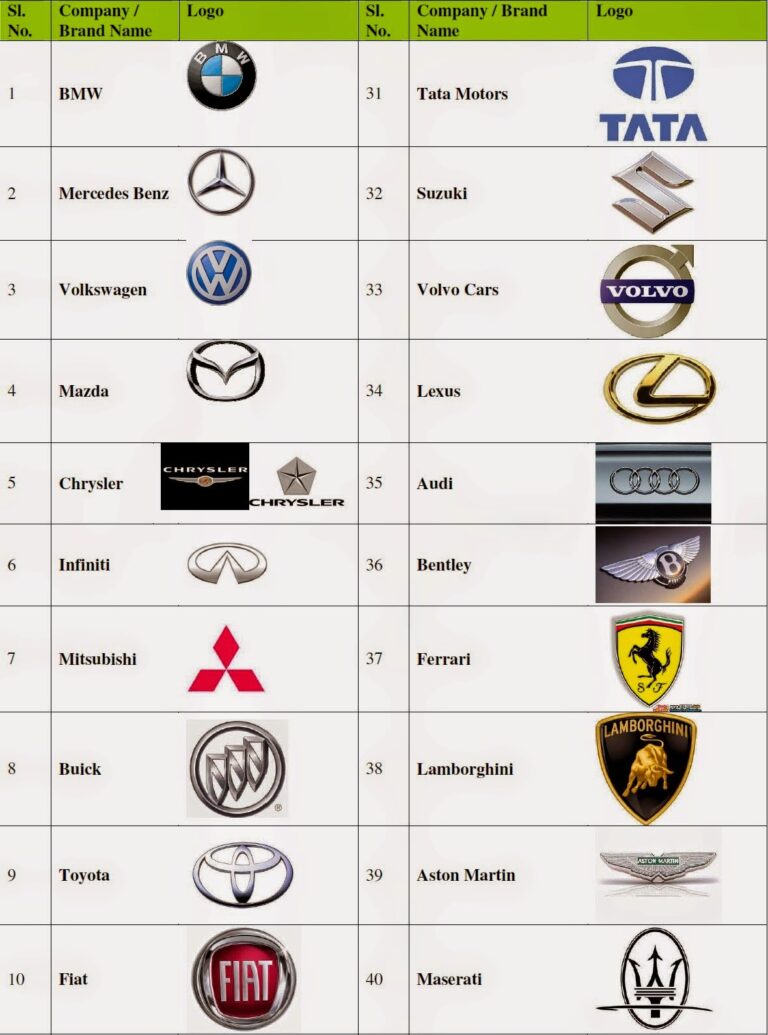Top Ten Car Brands: A Comprehensive Guide to Automotive Excellence
Top Ten Car Brands: A Comprehensive Guide to Automotive Excellence cars.truckstrend.com
The automotive industry is a dynamic landscape, constantly evolving with technological advancements, shifting consumer preferences, and global economic tides. Within this intricate ecosystem, certain brands consistently rise to the top, embodying excellence in design, engineering, reliability, innovation, and market presence. Defining the "Top Ten Car Brands" isn’t merely about sales figures; it’s a holistic assessment of a brand’s impact, its legacy, its future vision, and its ability to capture the hearts and minds of drivers worldwide. These are the titans of the tarmac, setting benchmarks for the entire industry and shaping the future of mobility.
Understanding these leading brands offers invaluable insight, whether you’re a prospective car buyer, an industry enthusiast, or simply curious about the forces driving one of the world’s largest sectors. This comprehensive guide will delve into what makes these brands exceptional, their unique strengths, and what they offer to a diverse global market.
Top Ten Car Brands: A Comprehensive Guide to Automotive Excellence
Methodology for Ranking the Elite
Ranking car brands is a complex undertaking, as "top" can be subjective. Our methodology for identifying the Top Ten considers a blend of critical factors:
- Global Sales Volume & Market Share: A strong indicator of widespread acceptance and market dominance.
- Brand Reputation & Legacy: Years of consistent quality, innovation, and customer trust build an invaluable reputation.
- Innovation & Technology Leadership: Pioneering new technologies, especially in areas like electrification, autonomous driving, and connectivity.
- Reliability & Durability: The ability of vehicles to perform consistently over time, minimizing maintenance issues.
- Design & Aesthetics: The visual appeal and emotional connection vehicles evoke.
- Customer Satisfaction & Loyalty: Repeat purchases and positive owner experiences.
- Resale Value: How well vehicles retain their value over time, reflecting desirability and perceived quality.
- Sustainability Efforts: Commitment to environmental responsibility and developing eco-friendly solutions.
- Brand Diversity & Market Reach: The ability to cater to a wide range of consumer needs and penetrate various global markets.


While sales figures provide a quantitative baseline, the qualitative aspects often define true brand strength and enduring appeal.
The Top Ten Contenders: Pillars of Automotive Excellence
Here’s a closer look at the brands that consistently define excellence in the global automotive arena:

Toyota: The undisputed leader in reliability and global sales, Toyota has built its empire on a foundation of quality, durability, and value. Pioneering hybrid technology with the Prius, Toyota remains at the forefront of fuel efficiency and sustainable mobility. Its diverse lineup, from the rugged Tacoma truck to the family-friendly RAV4 and luxurious Lexus division, caters to virtually every segment, earning immense customer loyalty worldwide.
- Key Strengths: Unmatched reliability, high resale value, fuel efficiency, extensive model range, hybrid leadership.
-
Volkswagen Group: A sprawling automotive conglomerate, the Volkswagen Group encompasses an impressive portfolio of brands including Volkswagen, Audi, Porsche, Skoda, SEAT, Lamborghini, and Bentley. This allows the group to dominate across segments, from affordable mass-market vehicles to ultra-luxury sports cars. Their commitment to engineering excellence, sophisticated design, and a strong push into electric vehicles (e.g., ID. series) solidifies their global influence.
- Key Strengths: Engineering prowess, diverse brand portfolio, strong European market presence, significant EV investment.
-
Mercedes-Benz: Synonymous with luxury, prestige, and groundbreaking automotive innovation, Mercedes-Benz has set the benchmark for premium vehicles for over a century. Known for its sophisticated design, opulent interiors, advanced safety features, and powerful performance, a Mercedes-Benz car represents status and comfort. Their EQ electric vehicle lineup signifies a strong pivot towards future mobility while maintaining their signature elegance.
- Key Strengths: Unrivaled luxury, cutting-edge technology, superior comfort, strong brand heritage, safety innovation.
-
BMW: "The Ultimate Driving Machine" – BMW’s slogan perfectly encapsulates its core identity. Renowned for its exceptional driving dynamics, precise engineering, and sporty yet luxurious appeal, BMW cars offer an engaging experience behind the wheel. With a strong focus on performance sedans, SUVs (SAVs), and an expanding range of electric "i" models, BMW continues to blend athletic prowess with premium comfort and advanced technology.
- Key Strengths: Dynamic driving experience, performance engineering, sophisticated design, technological integration.
-
Honda: A global powerhouse in both automobiles and motorcycles, Honda is celebrated for its reliable, fuel-efficient, and intelligently engineered vehicles. Models like the Civic and CR-V are perennial best-sellers, reflecting Honda’s commitment to practicality, safety, and a smooth driving experience. Their innovative VTEC engine technology and a growing focus on hybrid and electric powertrains underscore their commitment to future-proof mobility.
- Key Strengths: Exceptional reliability, fuel efficiency, practical design, strong engine technology, high owner satisfaction.
-
Ford: An American automotive icon, Ford has shaped the industry since its inception. Today, Ford remains a global giant, particularly strong in the truck and SUV segments with the ubiquitous F-Series trucks. The brand is aggressively investing in electrification, with successful models like the Mustang Mach-E and the F-150 Lightning demonstrating its capacity for innovation while staying true to its American heritage of rugged capability and value.
- Key Strengths: Dominance in trucks/SUVs, strong American market presence, innovative EV models, vast global reach.
-
Hyundai-Kia: Once considered value-oriented alternatives, Hyundai and Kia (part of the same parent company) have undergone a remarkable transformation. They now compete directly with established brands, offering stylish designs, advanced technology, impressive warranties, and a rapidly expanding range of highly competitive electric vehicles (e.g., Hyundai Ioniq 5, Kia EV6). Their aggressive product development and commitment to quality have earned them widespread acclaim.
- Key Strengths: Rapid design evolution, advanced technology features, excellent warranty, strong value proposition, leading EV designs.
-
Tesla: A true disruptor, Tesla redefined the electric vehicle market and pushed the entire industry towards electrification. Beyond EVs, Tesla is a technology company, renowned for its cutting-edge battery technology, autonomous driving capabilities (Autopilot/FSD), and unique direct-to-consumer sales model. While facing production challenges, its innovation and cult-like following solidify its position as a top brand shaping the future of transportation.
- Key Strengths: EV market leadership, advanced battery technology, autonomous driving innovation, unique brand identity.
-
General Motors (GM): A long-standing pillar of the American automotive industry, GM boasts a diverse brand portfolio including Chevrolet, GMC, Buick, and Cadillac. With a dominant presence in trucks and SUVs, GM is now heavily investing in its "Ultium" battery platform, signaling a significant push into electric vehicles across its brands. From robust workhorses to luxury cruisers, GM caters to a broad spectrum of American and global consumers.
- Key Strengths: American market dominance, strong truck/SUV lineup, significant EV technology investment, diverse brand offerings.
-
Audi: As part of the Volkswagen Group, Audi stands out as a distinct premium brand known for its sophisticated design, cutting-edge technology, and the legendary Quattro all-wheel-drive system. Audi vehicles blend luxury with sportiness, offering refined interiors, powerful engines, and intuitive infotainment systems. Their "e-tron" electric vehicle lineup is a testament to their commitment to future-forward luxury mobility.
- Key Strengths: Elegant design, advanced technology integration, performance (especially Quattro AWD), luxurious interiors.
Key Factors Driving Enduring Brand Success
Beyond individual brand strengths, several overarching factors contribute to a car brand’s consistent presence among the top ten:
- Innovation & Technology: The relentless pursuit of new technologies, from powertrain efficiency and safety systems to infotainment and connectivity, is paramount. Brands that embrace and lead technological shifts, especially in electrification and autonomous driving, secure their future.
- Reliability & Durability: For most consumers, a car is a significant investment. Brands that consistently deliver dependable vehicles with low ownership costs build trust and foster long-term loyalty.
- Design & Aesthetics: While subjective, a strong and consistent design language creates brand identity and emotional appeal. Cars are often a reflection of personal style, and compelling design can be a powerful differentiator.
- Brand Heritage & Reputation: A rich history of quality, performance, or innovation builds a powerful narrative and instills confidence. A strong reputation is hard-earned and invaluable.
- Global Reach & Adaptability: The ability to understand and cater to diverse market needs, regulations, and consumer preferences across different regions is crucial for global dominance.
- Sustainability & Social Responsibility: As environmental concerns grow, brands demonstrating a genuine commitment to reducing their carbon footprint, developing eco-friendly vehicles, and engaging in responsible business practices gain significant favor.
- Customer Experience: Beyond the vehicle itself, the overall customer journey—from sales and financing to after-sales service and support—plays a vital role in brand loyalty and reputation.
How to Choose the Right Car Brand for You
While the "Top Ten" list provides a strong starting point, the ideal brand for you depends on your individual needs, preferences, and budget. Here’s practical advice:
- Define Your Needs & Budget: Are you commuting solo, hauling a family, or seeking off-road adventures? What’s your realistic budget for purchase, insurance, fuel/charging, and maintenance?
- Research Reliability & Safety: Consult independent ratings from organizations like J.D. Power, Consumer Reports, and NHTSA/IIHS for crash test results and reliability scores.
- Consider Fuel Type/Powertrain: Decide between gasoline, hybrid, plug-in hybrid, or full electric, considering your driving habits, access to charging, and environmental goals.
- Evaluate Resale Value: Some brands and models hold their value better than others, which can significantly impact your total cost of ownership.
- Read Reviews & Watch Comparisons: Get insights from automotive journalists and current owners.
- Test Drive, Test Drive, Test Drive: There’s no substitute for experiencing a car firsthand. Pay attention to comfort, visibility, handling, technology interface, and overall driving feel.
- Check Local Dealership & Service Reputation: A great car can be marred by poor service. Research local dealerships for their customer service reputation.
Challenges and Future Trends for Top Car Brands
The automotive industry is facing unprecedented transformation, presenting both challenges and opportunities for these leading brands:
- The Electrification Transition: Shifting from internal combustion engines to electric vehicles requires massive investment in R&D, manufacturing, and charging infrastructure. It’s a race to innovate and scale EV production.
- Autonomous Driving Development: The promise of self-driving cars is immense, but the technological, regulatory, and ethical hurdles are significant. Brands are investing heavily but progress is slow and complex.
- Supply Chain Resilience: Global events (like the chip shortage) have highlighted the fragility of complex supply chains, forcing brands to rethink their sourcing strategies.
- Intense Competition: New EV startups and tech giants entering the mobility space are challenging traditional automakers, fostering fierce competition for talent and market share.
- Changing Ownership Models: The rise of car-sharing, subscription services, and ride-hailing could alter traditional car ownership patterns, requiring brands to adapt their business models.
- Sustainability Demands: Increasing pressure from consumers, governments, and investors for sustainable manufacturing, ethical sourcing, and carbon neutrality.
Conclusion
The "Top Ten Car Brands" represent the pinnacle of automotive engineering, design, and market influence. They are not static entities but dynamic powerhouses, constantly innovating and adapting to a rapidly changing world. From Toyota’s unwavering reliability to Tesla’s disruptive innovation, and from Mercedes-Benz’s timeless luxury to Ford’s rugged utility, these brands offer a testament to human ingenuity and a commitment to mobility.
As the industry hurtles towards an electrified, connected, and increasingly autonomous future, these leading brands are poised to continue shaping our journeys. For consumers, understanding their strengths and offerings is key to making informed decisions, while for enthusiasts, observing their evolution promises an exciting ride ahead. The "top" may shift, but the pursuit of automotive excellence remains a constant driving force.
Top Ten Car Brands: At a Glance
| Rank | Brand Name | Country of Origin | Key Strengths | Representative Model Price Range (USD)* |
|---|---|---|---|---|
| 1 | Toyota | Japan | Unmatched Reliability, High Resale Value, Hybrid Leadership, Global Reach | $22,000 – $60,000 |
| 2 | Volkswagen Group | Germany | Engineering Prowess, Diverse Brand Portfolio, Global Market Dominance, EV Focus | $25,000 – $200,000+ (across brands) |
| 3 | Mercedes-Benz | Germany | Unrivaled Luxury, Cutting-Edge Technology, Superior Comfort, Strong Heritage | $40,000 – $250,000+ |
| 4 | BMW | Germany | Dynamic Driving Experience, Performance Engineering, Sophisticated Design | $40,000 – $150,000+ |
| 5 | Honda | Japan | Exceptional Reliability, Fuel Efficiency, Practical Design, Engineering Excellence | $23,000 – $50,000 |
| 6 | Ford | USA | Dominance in Trucks/SUVs, Strong American Heritage, Innovative EV Models | $25,000 – $100,000+ |
| 7 | Hyundai-Kia | South Korea | Rapid Design Evolution, Advanced Technology, Excellent Warranty, Strong Value | $20,000 – $70,000 |
| 8 | Tesla | USA | EV Market Leadership, Advanced Battery Technology, Autonomous Driving Innovation | $40,000 – $130,000+ |
| 9 | General Motors | USA | American Market Dominance, Strong Truck/SUV Lineup, Significant EV Investment | $25,000 – $100,000+ |
| 10 | Audi | Germany | Elegant Design, Advanced Technology Integration, Performance (Quattro AWD), Luxury | $40,000 – $180,000+ |
Note: Price ranges are approximate starting MSRPs for popular models and can vary significantly based on trim, options, and market conditions. They are provided to give an indication of market positioning rather than exact pricing for all models within a brand’s lineup.
Frequently Asked Questions (FAQ)
Q1: Which car brand is considered the most reliable?
A1: Toyota consistently ranks at or near the top for reliability across various independent studies (e.g., J.D. Power, Consumer Reports), followed closely by brands like Lexus (Toyota’s luxury division) and Honda. Their long-standing commitment to quality control and durable engineering is a key factor.
Q2: Are luxury car brands worth the extra cost?
A2: It depends on individual priorities. Luxury brands like Mercedes-Benz, BMW, and Audi offer superior materials, advanced technology, enhanced comfort features, and often more powerful engines. They also tend to provide a higher level of prestige and a more refined driving experience. However, they typically come with higher purchase prices, insurance costs, and maintenance expenses. For some, the added features and brand experience justify the cost; for others, a mass-market brand offers better value.
Q3: How often do these "Top Ten" rankings change?
A3: While the core group of top brands tends to remain consistent due to their established market presence and infrastructure, their exact ranking within the top ten can shift year to year. Factors like new model releases, sales performance, technological breakthroughs, and changes in consumer sentiment can influence their position. Major disruptions, like Tesla’s rise, can also significantly alter the landscape.
Q4: What’s the biggest challenge facing traditional car brands with the rise of EVs like Tesla?
A4: The biggest challenge is adapting quickly and effectively to the electric vehicle transition. This involves massive investments in battery technology, charging infrastructure, and retooling manufacturing plants, all while managing the decline of traditional internal combustion engine sales. They also face competition from agile, tech-focused EV startups that don’t carry the legacy costs or traditional dealership models.
Q5: Which car brand holds its value best?
A5: Brands known for their reliability and strong demand tend to hold their value best. Toyota, particularly its truck and SUV models, and Honda are often cited for excellent resale value. Subaru also performs well in this regard. Luxury brands can depreciate more rapidly, though some high-demand luxury performance models can defy this trend.






